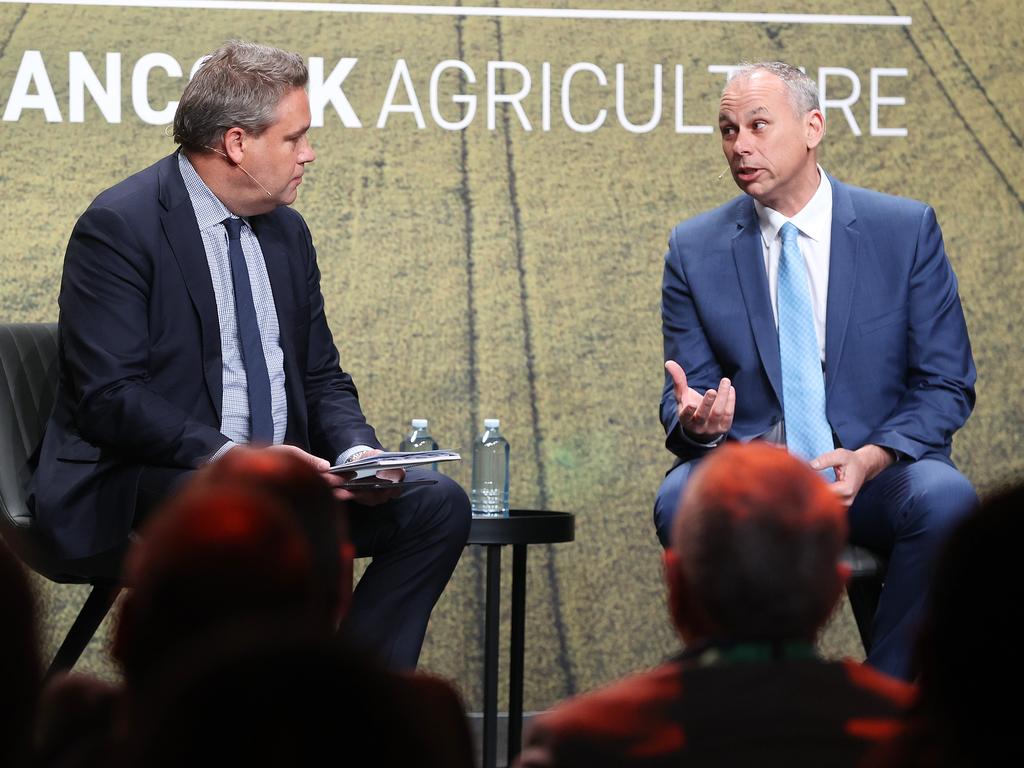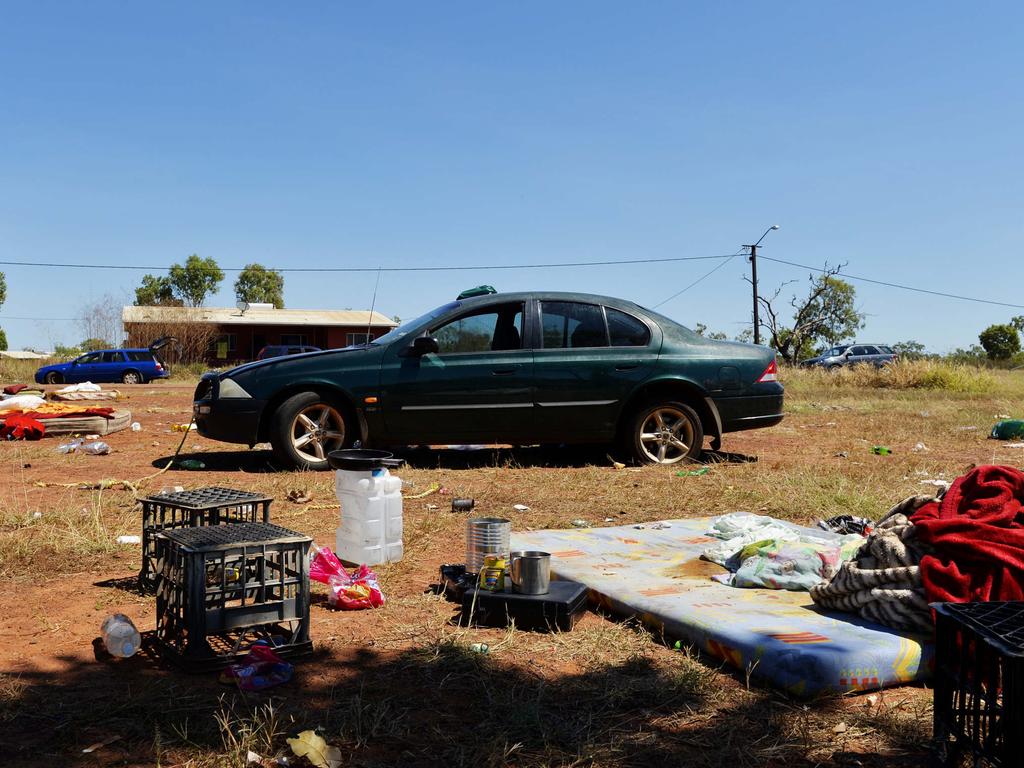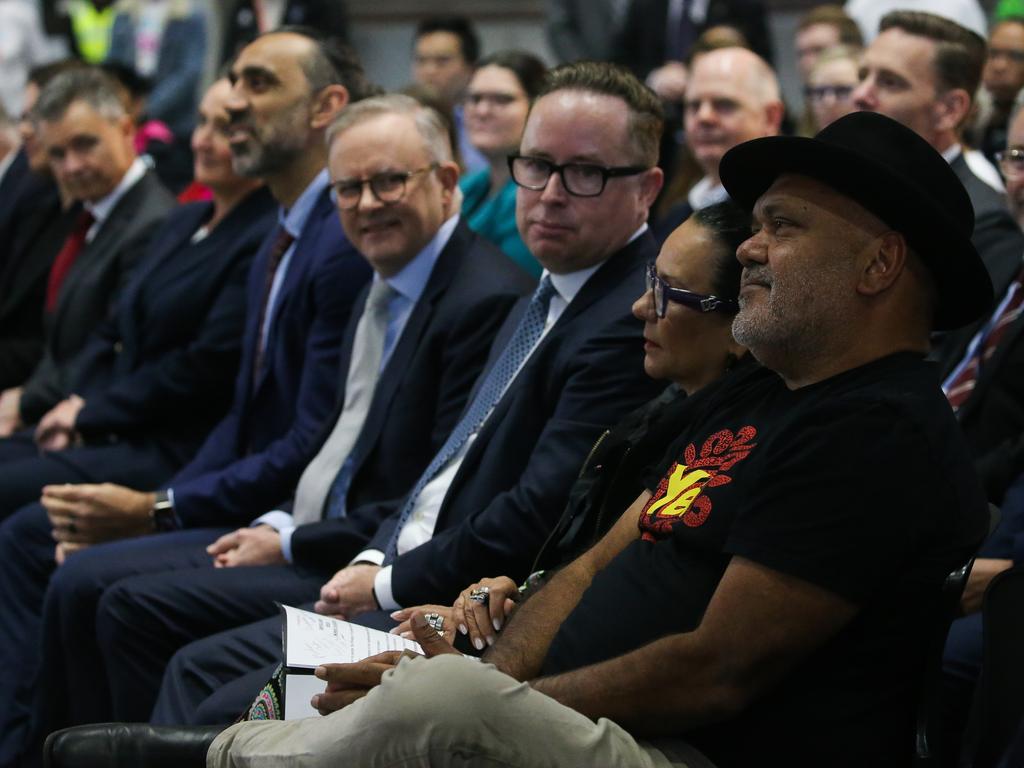‘Stay out of it’: Rinehart CEO blasts companies backing Yes campaign
The chief executive of Gina Rinehart’s agricultural empire has slammed Australian corporations for backing the Yes campaign.
The chief executive of Gina Rinehart’s agricultural empire has slammed Australian corporations for backing the Yes campaign, saying business should “stay out of it”.
Adam Giles, former Chief Minister of the Northern Territory and now CEO of the mining magnate’s farming assets, Hancock Agriculture and S. Kidman & Co, has spoken out in several recent interviews to decry large companies including Qantas, Woolworths, Wesfarmers, Rio Tinto and BHP taking a side in the Voice debate — and contributing millions in donations and marketing.
“I think [corporates] should stay out of it,” Mr Giles, who is Indigenous, told podcaster Jody Rowe earlier this month in comments featured in Monday’s Media Diary in The Australian.
“I don’t get involved in it, and as I say in this company, let’s stay in our lane. We grow cattle. We grow beef. We talk to the consumer. None of our business happens in the political world, and I don’t think we should.”
Mr Giles told the Tough Talk host he didn’t think corporate contributions to the Yes campaign were the “best use of shareholder funds”.
“I see a little bit of commentary about whether shareholders might have some sort of class action against companies, and I think they have every right to,” he said.
“It’d be interesting to see that tested. But if you’re spending two or three million dollars of shareholders’ money and profits on a political campaign which is only one side of a story, I don’t think that’s the best use of shareholders’ funds.”

In a separate interview with Sky News host Andrew Bolt, Mr Giles suggested companies would be better off spending that money directly to help Indigenous communities.
“Rather than spend all of this money on the Voice and have all of these corporations donating money to a government campaign, it would be far better to divide that money up and give it to every prescribed [Indigenous] body corporate and getting them involved in economics, supporting business development and job creation,” he said.
Last month, senior Australian businessman Graham Bradley made similar comments to The Australian, saying he didn’t believe the Voice was a topic where companies “have a legitimate authority to take a public corporate position”.
“Many companies have taken a public position on the Voice prematurely, before the parliament had voted on the wording of the referendum proposal,” he said. “This is poor governance even if you view the Voice as an issue where corporate entities have some legitimate advocacy role.”
Mr Bradley said he questioned “for whom companies speak on issues such as this”.
“Is it their shareholders? Have they canvassed the views of their shareholders before becoming advocates? Or is it employees and have they been canvassed? Customers?” he said.
“If these stakeholder groups were to be canvassed and were likely found to be as divided as the general community, it would in my view be wrong for a board to take a public advocacy position in the name of the company. Better to let individual executives take positions in their own name, not usurp their stakeholders by taking corporate positions.”

Speaking on Rowe’s podcast, Mr Giles stressed that his position on the Voice was “that I’m just an Australian”, and that he was not campaigning for either side despite being lobbied by both the Yes and No camps.
“I refuse to get involved — I’m not in politics,” he said.
But he said based on his own experience in the Northern Territory, his personal view was “that the Voice is not the right approach”, although he did support a preamble to the constitution.
He claimed the Voice was a “political tool” that had sparked a “wildfire that is now uncontrollable”.
“It’s taking reconciliation and race relations back a step or two, and people have had a gutful,” he said.
“By the government not explaining what it is — I don’t know what it is and I’m pretty well informed, I understand all the issues. Now you’re seeing this great divide between black and white Australia. We see things such as [Western Australia’s] Cultural Heritage Act … people saying they want compensation or a treaty is upsetting people. People say that’s a scare campaign, it’s not. It’s real.”
Mr Giles argued Indigenous Australians did not care about constitutional change and just wanted “education for their kids, jobs for themselves and economic development”.
“In my time as Chief Minister and in opposition, when I would sit in the dirt and talk to people in the remote Northern Territory, and I would say to them, ‘Do you want a change in the constitution?’ People would say to me, ‘I want a house to live in. I want a roof over my head. I want a flushing toilet. I don’t know what the constitution is,’” he said.

“In my whole time in politics in the Northern Territory not one person told me they wanted to change the constitution. So that’s where I get my decision-making from. I think it’s a cruel farce. I think it’s very upsetting that Aboriginal people are being used in a political tool.”
Last week, Qantas boss Alan Joyce reaffirmed the airline’s support for the Voice, unveiling the Yes campaign logo on three aircraft at an event alongside Prime Minister Anthony Albanese on Monday.
He announced key members of the Yes campaign and the Uluru Dialogue will also receive free flights in order to travel to regional and remote Australia to spread the message ahead of the referendum.
Mr Joyce said the national carrier was “literally flying the flag” in support for the Voice. “These aircraft will cover a huge amount of the country,” he said. “Every major city, every major town will get to see this message, which is fantastic.”
Influential pollster Kos Samaras of RedBridge group told news.com.au last week the Yes campaign had been “not wise” in lining up with what he called “successful Australia” — CEOs, large corporations and celebrities — to sell the message to “unsuccessful Australia”.
“Corporate Australia’s social capital has been on the decline for many years and relying on them to sell the message has in some way eroded the authenticity of the Yes proposition,” he said.
“People’s response is, ‘Bank CEOs and politicians are saying I should vote Yes — this is all political.’ People have become a lot more cynical. [The Yes campaign is] missing the growing resentment within the community around some of these institutions. The Yes campaign should have avoided using the top end of town and just focused on selling the message using First Nations people.”






